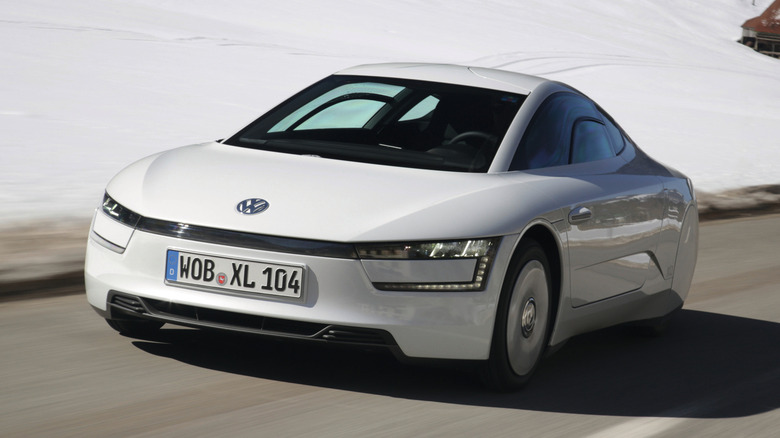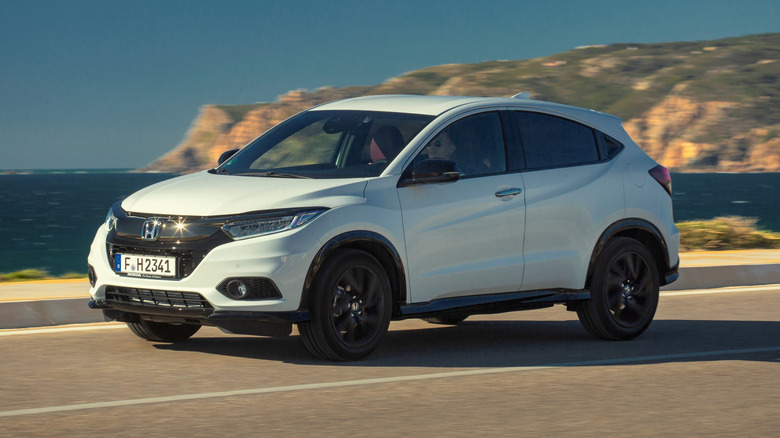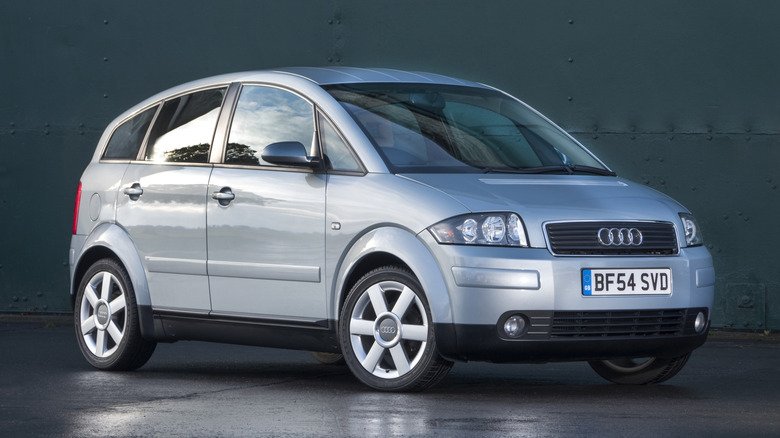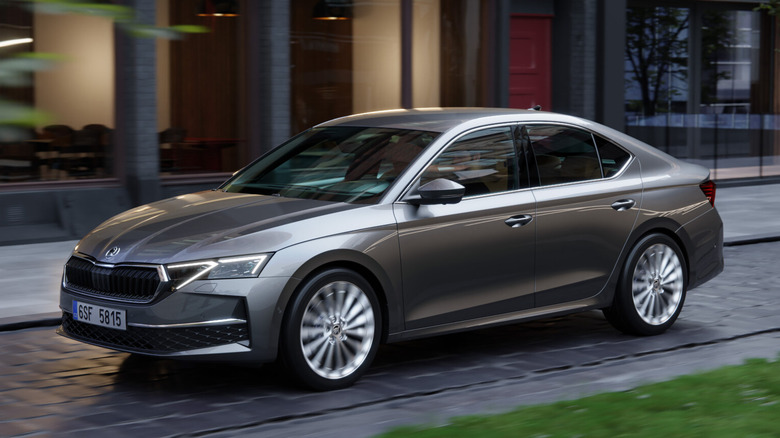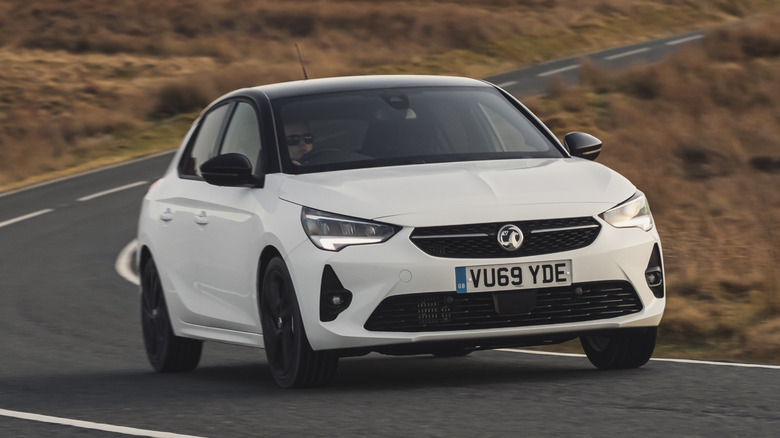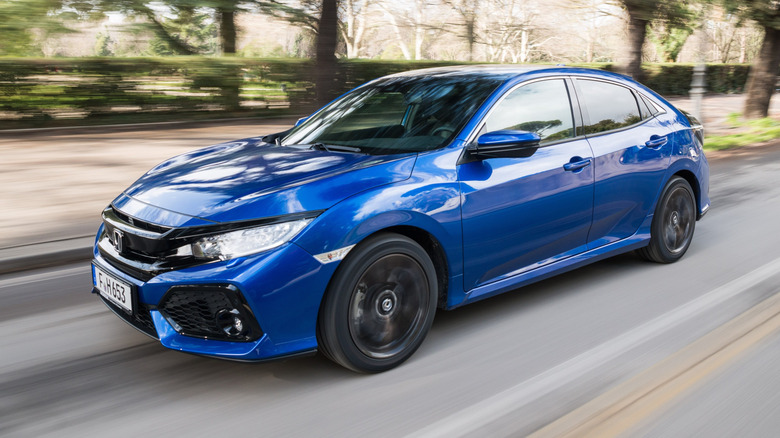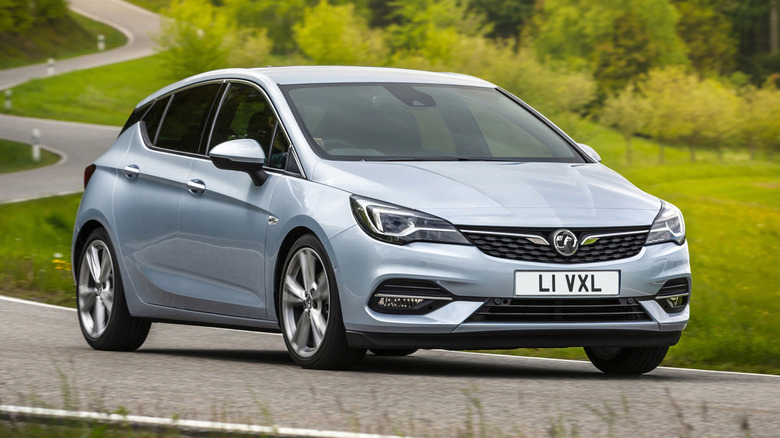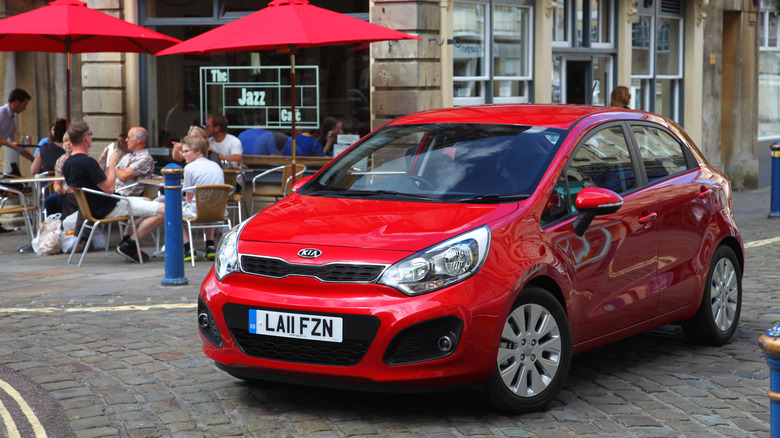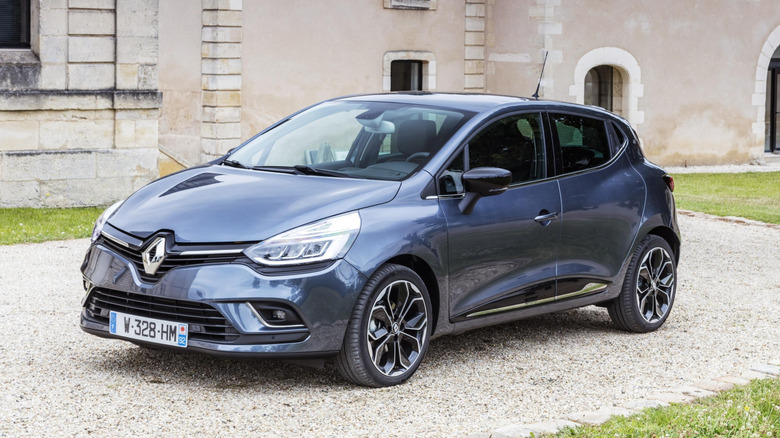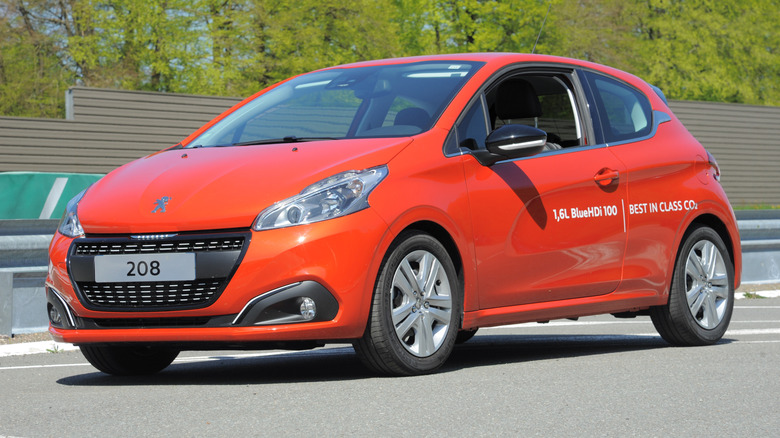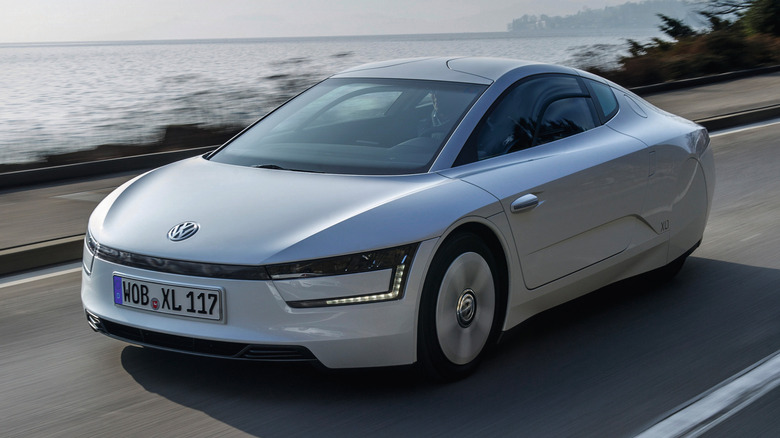10 Of The Most Fuel-Efficient Diesel Vehicles Ever Put Into Production
For many years, diesels were the undisputed masters of frugality, but with the rising popularity of zero emissions vehicles and the lasting effects of the Dieselgate scandal, they're no longer in vogue. However, diesel cars still retain a small but loyal following, and not every manufacturer has given up on their development. In fact, many modern diesel cars are now more efficient than ever before, and they're readily available in dealerships too. Unfortunately for U.S. diesel enthusiasts, most of those dealerships are in Europe, as leading manufacturers like Mercedes-Benz have chosen not to bring their diesel models stateside due to a chronic lack of demand.
Across the pond, a range of exceptionally frugal diesel cars have been offered by carmakers in the past decade or so, and there are a small number of older models that stand out as top performers as well. We've rounded up a non-exhaustive list of ten of the most efficient diesel cars made to date, including a mix of both popular and less well remembered models. All figures are sourced from the cars' respective manufacturers and converted to American miles per gallon.
Honda HR-V i-DTEC – 47 mpg
While it can't quite match the frugality of the most efficient diesel cars ever built, the Honda HR-V's Euro-spec diesel variant is impressive considering its size. Plus, it's a Honda, and so is very likely to remain reliable –- and just as efficient –- even after racking up high mileage. The 1.6L i-DTEC diesel engine that featured in the 2019 Euro-spec HR-V was officially rated at 5.0L/100km, which translates to almost exactly 47 American mpg.
The engine came mated to a six-speed manual transmission with no automatic offered, although gas-powered HR-V variants received a CVT. Accelerating from 0-62 mph took a full 10 seconds, and the engine's 118 horsepower output made the diesel HR-V's performance far from exciting. Buyers looking for a zippier variant could opt for a turbocharged gas-powered HR-V with around 158 horsepower on offer, but for pure efficiency, there was no beating the diesel. Honda no longer offers a diesel HR-V, having replaced the car in its lineup with a gas-electric hybrid.
Audi A2 – 54.7 mpg
Having debuted at the turn of the century makes the Audi A2 is the oldest model listed here, which makes its pioneering efficiency all the more commendable. The oddball compact car never lived up to Audi's sales expectations thanks to its premium price and unusual looks, and as a result, it saw no direct successor. Those looks helped contribute to the car's high efficiency figures, as it was significantly more aerodynamic than anything in its class at the time. It was also relatively lightweight, giving the car's 1.4L TDI engine less mass to lug around. It resulted in efficiency figures of 65.7 UK mpg combined, which equates to 54.7 American mpg.
In urban-only driving, the car achieved even higher figures, reaching an officially quoted 80.7 UK mpg, or 67.2 American mpg. As if the standard A2 wasn't efficient enough, Audi also released a limited-run 3L special edition of the car featuring skinnier tires and a smaller 1.2L diesel engine that could achieve around 78 American mpg. It was undoubtedly an engineering triumph, but that never translated to high sales, and today the A2 is a rare sight in the markets in which it was originally sold.
Skoda Octavia – 54.7 mpg
While the Audi A2 may have been out of dealerships for many years, buyers in certain European territories can still spec an equally frugal diesel VW Group car today. That car is the Skoda Octavia, a compact hatchback that is the Czech brand's best-selling model by a significant margin. Skoda serves as one of VW's value-oriented brands, offering a cheaper alternative to the German marque and featuring electric, gas, and diesel cars in its lineup.
The Octavia is available in either gas, mild hybrid, or diesel form, with the latter configuration being a 2.0L TDI engine mated to a six-speed manual transmission. It's rated by Skoda for 54.7 American mpg, although it's worth noting that, like most of the Euro-market cars here, this figure was calculated using the WLTP protocol.
WLTP regulations were launched in Europe in 2017 and aimed to provide a more realistic estimate of efficiency than previous regulations, but the testing process differs from the American EPA standard. As such, there's always some margin for error when converting between U.K., European and American ratings, but it's safe to say the diesel Octavia would be a top performer for its segment no matter how it was measured.
Vauxhall/Opel Corsa – 58.8 mpg
A common sight on British roads for more than three decades, the Vauxhall Corsa hatchback remains popular in its home country today. Part of that enduring popularity comes down to the model's ability to adapt to changing market tastes –- for example, the current generation car was available at launch with gas, diesel, and electric powertrains. The latest generation diesel Corsa was capable of 70.6 U.K. mpg, which equates to roughly 58.8 American mpg.
In mainland Europe, the Corsa is sold under the Opel marque, with both being part of the Stellantis conglomerate. Opel also offered a diesel Corsa variant in certain markets, although neither Vauxhall nor Opel sell a diesel Corsa today. Instead, both offer a hybrid gas-powered variant which has effectively replaced the diesel in the two respective lineups.
Much like previous evolutions of the Corsa, this change simply reflects evolving buyer preferences. Data collected by Cox Automotive and published by Car Dealer showed rapidly declining demand in the U.K. for diesel cars, from a 38% market share in 2016 to 2019 to just 13% in 2020 to 2023. That demand is forecasted to drop even further in the coming years, with the same study predicting the UK market share for diesels would be as little as 3% by 2028. As a result, the latest diesel Corsa is very likely to be the last.
Honda Civic i-DTEC – 67.2 mpg
Another automaker that's shifted its focus away from diesels to focus on electrification in recent years is Honda. The Japanese automaker previously offered the Civic i-DTEC in certain European markets, but axed all of its diesel cars on the continent in 2021. Before it got the chop, the Civic i-DTEC was officially rated for 67.2 American mpg, with a power output of 118 horsepower. The most recent variant of the diesel Civic was launched in 2018, and so saw only a few short years on sale. It was effectively replaced in the lineup by a hybrid gas-electric variant with the launch of the new generation Civic in 2022.
This gas-electric hybrid variant is sold in the U.S. and SlashGear recently spent some time putting the car through its paces. Our reviewer came away largely impressed, noting that the practicality and driving dynamics that the Civic is known for remain unchanged with the introduction of the hybrid powertrain. However, the latest hybrid Civic's 48 mpg combined still doesn't match the efficiency of the previous generation Civic diesel.
Vauxhall/Opel Astra – 70.8 mpg
Much like its smaller lineup sibling, the Corsa, the Vauxhall/Opel Astra is a long running model that can be readily found on streets right across the U.K. and Europe. In 2019, a diesel Astra achieved 70.8 American mpg in real-world tests, making it significantly more efficient than its maker had previously claimed. This is highly unusual –- most carmakers tend to make their official efficiency figures as optimistic as possible –- but proved an unexpected bit of positive publicity for the Astra's maker.
However, this extra publicity didn't translate into significant additional sales. Much like the Corsa, browsing through the lineup of Vauxhall today reveals no trace of a diesel model -– instead, a selection of pure electric, hybrid, and gas-powered variants are offered. As of this writing, Vauxhall's continental counterpart Opel still sells a 130 horsepower 1.5L diesel variant of the Astra, although how much longer it stays in the brand's lineup remains to be seen.
Kia Rio – 73.3 mpg
The unassuming 2011 Kia Rio was offered in some markets with a diesel engine that, according to its makers, could achieve 73.3 mpg, making it one of the most efficient diesel cars ever built. Kia's press release noted that, at the time of its release, the car boasted "lower fuel consumption and CO2 emissions than any other non electric car on sale in the world, including hybrids and eco specials from rival companies." The engine that achieved this feat in the Rio was a 1.1L three-cylinder engine with a modest 74 horsepower on tap.
A larger 1.4L diesel was also offered in the Rio, boasting a still impressive efficiency rating of 58.8 American mpg. This variant offered 89 horsepower –- slightly less sluggish, but still less potent than the 110 horsepower gas-powered Rio. In its most efficient 1.1L diesel form, the Rio took a leisurely 15.5 seconds to get from 0-60 mph, and topped out at 100 mph. It might not have been the fastest way to get where you needed to go, and — since it was a 2011 Kia — it was far from the most luxurious to boot, but on efficiency alone the Rio had its competition beat.
Renault Clio 1.5 dCi 90 ECO – 73.5 mpg
It's always worth taking manufacturer efficiency claims with a grain of salt, especially those achieved using the notoriously optimistic NEDC regulations. However, the 2017 Renault Clio's rating of 88.3 U.K. mpg — 73.5 American mpg — makes it comfortably one of the most efficient cars of its era, even if drivers might require a light foot to hit the same numbers on their daily commute. Like so many of the other ultra-efficient diesels here, the Clio is a small hatchback designed for Europe, where diesel cars have historically seen greater sales success.
This iteration of the diesel Clio would prove to be the last of its kind, as Renault confirmed that it would stop investing in new diesel engines in 2021. This was primarily a result of slipping sales, with annual totals decreasing every year since the VW Dieselgate scandal hit the headlines in 2015. Like many manufacturers, Renault confirmed it was instead investing in electrification, with the results of that investment now beginning to bear fruit in the shape of the upcoming Renault 5 EV.
Peugeot 208 BlueHDi – 78.4 mpg
French carmakers have battled amongst themselves for diesel supremacy for years, but in 2015 Peugeot achieved a record that seemed almost impossible to beat. Under the watchful eye of French regulators, a stock 208 BlueHDi achieved a testing record of 2.0L/100km, or 117.6 American mpg. This was under controlled conditions, with the carmaker employing its own test drivers to complete the feat. However, the car's official rating for real-world driving was still world-beating, at 78.4 American mpg.
The car, which could be bought through Peugeot dealerships as an options package, included a specially designed rear spoiler and Michelin Energy Saver+ tires. Its engine was relatively large compared to many of the top performers here, being 1.6L in displacement, and it was mated to a manual transmission.
The varying ways to measure efficiency –- real world versus official ratings, differences in calculation methods –- mean that there's no definitive way to say which mass-produced diesel car is the most efficient ever built, but Peugeot's diminutive hatchback makes a solid claim to the title. There is one low-volume production car, however, that comfortably eclipses it.
VW XL1 – 261 mpg
Rather ironically given that its Dieselgate scandal can be partly blamed for the demise of the diesel engine, VW holds the record for the most efficient diesel-powered car ever built. The XL1 was designed specifically for the task and put into limited production after completing its record, with 200 examples built at a retail price of well over $100,000 each.
It featured a plug-in hybrid diesel powertrain with a two-cylinder TDI engine and achieved 0.9 l/100 km in testing, which equates to 261 mpg. The car's slippery shape and light weight helped contribute to that achievement, as did its unusually low center of gravity. However, none of that would have mattered too much without the exceptionally frugal engine, which was specially designed and only ever sold in the XL1.
The car was unveiled in 2013 and by the time the last example was delivered to customers, the storm was already brewing for what would turn out to be one of VW's biggest scandals ever. Dieselgate permanently changed the way many buyers saw diesel cars, and cast a shadow over all of its previous efficiency achievements. Sadly, that included its most efficient diesel car ever, even if there was never any suggestion that the XL1's record came about as a result of foul play.
